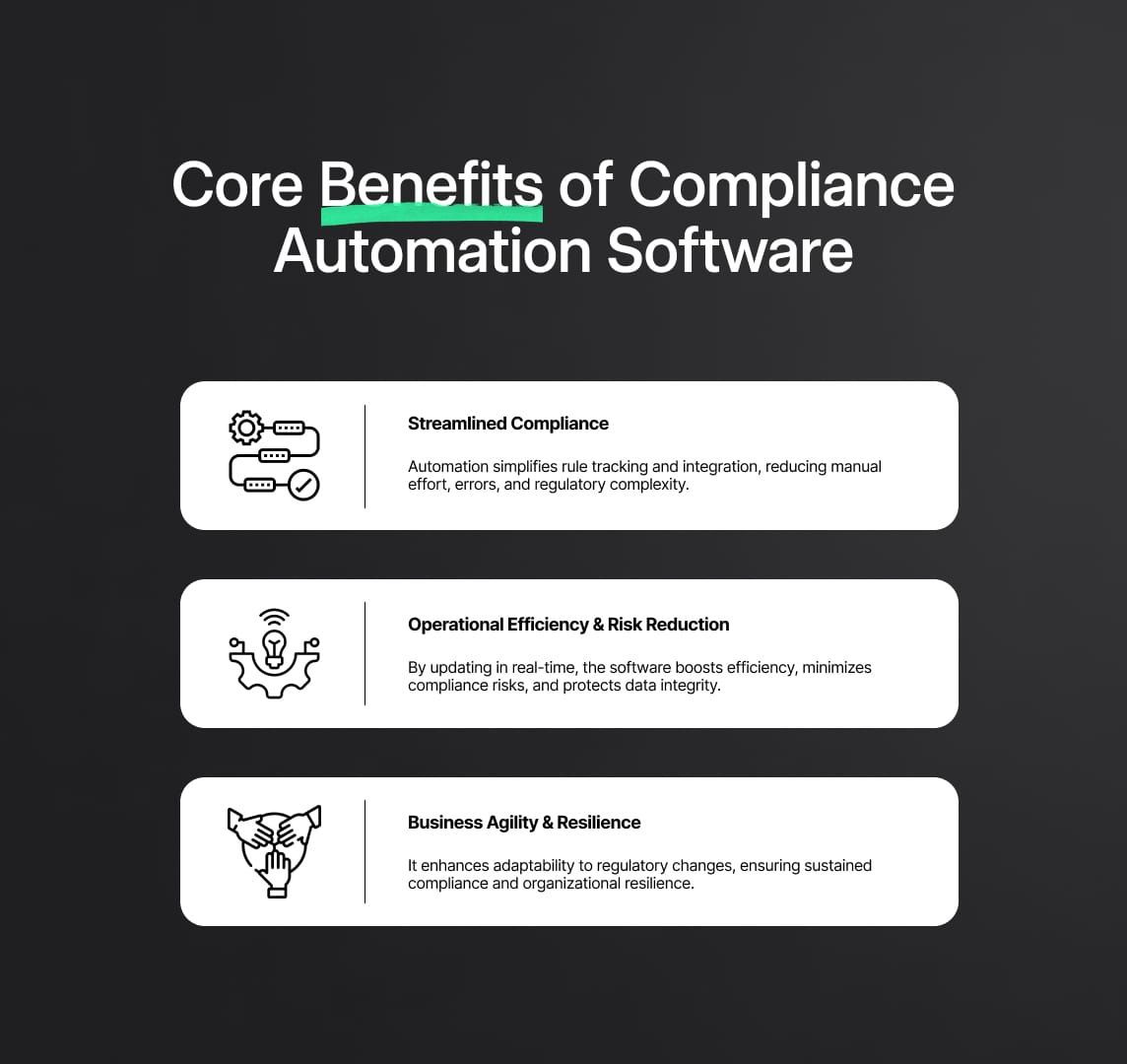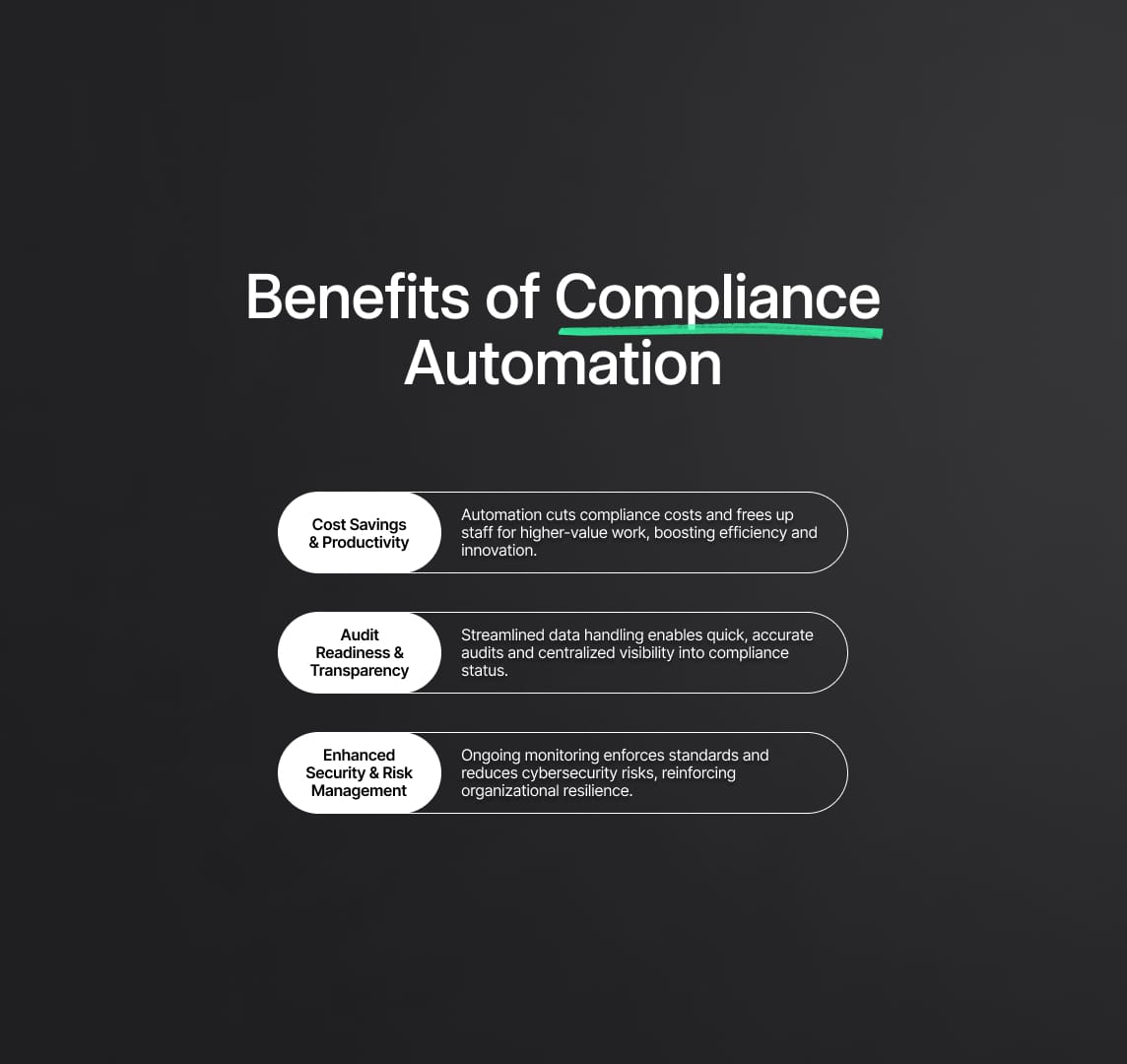Compliance Automation: Benefits for Financial Services
Discover the transformative role of compliance automation in today's evolving business landscape. This detailed exploration underscores the importance of automation softwares in managing compliance, positioning it as a pivotal tool in the GRC solutions toolkit.

Grand “Answer”:
Compliance automation benefits financial services in several ways[2]. It helps eliminate manual processes which can be time-consuming and prone to error, thus increasing efficiency [1]. By simplifying complex procedures, it aids in achieving faster audits which can greatly reduce the cost and time spent on these processes [1]. Furthermore, automation allows for standardized outcomes which can improve consistency, a critical aspect for financial institutions that have to adhere to strict regulatory standards [1]. All in all, compliance automation can provide considerable operational and economic advantages to financial services.
Compliance Automation: The Evolving GRC Landscape
In today's ever-evolving, complex business world, ensuring compliance with the multitude of regulatory requirements can be a daunting task for organizations. Compliance automation has emerged as the game-changer in this arena, transforming the landscape of regulatory compliance and strengthening organizations' cybersecurity. At its core, compliance automation software is a state-of-the-art tool that simplifies and automates the various tasks and processes associated with regulatory compliance.
The key to understanding the essence of compliance automation software lies in examining its components. This digital marvel is designed with a keen focus on the automation of myriad tasks that fall within the ambit of compliance. From facilitating regular self-assessments and control analyses to orchestrating and implementing corrective actions, compliance automation software acts as the ultimate digital Swiss Army knife – integrating a multitude of functionalities essential for adhering to an organization's security protocols and regulatory mandates.
A distinctive attribute of compliance automation software is its ability to integrate and evolve with the multitude of sector-specific regulations, standards, and security measures. This dynamic functionality fosters a broad-ranging, continually updating database of compliance-related information. This vast repository provides business leaders with timely and accurate insights into the latest regulatory changes, aiding them in making well-informed decisions about risk management, third-party risks, and potential vulnerabilities. By eliminating errors and inaccuracies in compliance processes and reporting, compliance automation software provides organizations with a crucial edge in the competitive marketplace.
Compliance Automation Software
In the dynamic, evolving digital ecosystem, businesses are constantly challenged to maintain high-grade security and stringent compliance. Traditional methodologies, though offering interim solutions, frequently fall short, potentially broadening the attack surface and increasing susceptibility to security breaches. Amid these challenges, the strategic solution of compliance automation software has emerged. It's a modern innovation, revolutionizing traditional operational frameworks to align with the demands of the contemporary digital environment. Compliance, an ever-evolving target, adapts to ongoing changes in rules, regulations, and industry standards. The power of compliance automation software lies in its potential to bridge the gap between technological innovations and policy amendments, delivering a streamlined, efficient way of interpreting and integrating these changes.

Core Benefits of Compliance Automation Software
- Simplification of Compliance Process: Compliance automation software mitigates the complexities of staying current with changing rules and regulations. It automatically interprets and integrates these modifications into the system, which saves valuable resources and minimizes potential human error, often linked with manual procedures.
- Adaptation to the Changing Compliance Landscape: As rules and regulations evolve, so does compliance automation software. It automatically updates to mirror these changes, enabling organizations to maintain compliance without extensive manual intervention. This adaptability means businesses can stay compliant without diverting significant resources towards understanding and implementing new regulatory changes.
- Maintenance of Data and Operational Integrity: By keeping systems aligned with the latest compliance standards, the software minimizes the risk of breaches resulting from non-compliance or outdated security measures. This helps preserve data integrity and ensures smooth, compliant business operations.
- Reduction in Digital Ecosystem Complexity: In the quest for compliance, businesses often stack new technologies onto existing structures, leading to a complex and potentially vulnerable digital ecosystem. Compliance automation software helps businesses avoid this pitfall by applying changes in a structured and organized manner, simplifying the compliance management process.
- Increase in Operational Efficiency: Automation eliminates the need for dedicated teams to continuously monitor and adapt to changing rules and regulations. This leads to improved overall efficiency and strategic deployment of resources. The time saved can then be invested in activities that drive business growth.
- Minimization of Risks: The software proactively ensures compliance with the latest standards and regulations. By doing so, it significantly reduces the likelihood of financial and reputational damage resulting from non-compliance incidents.
- Enhancement of Business Resilience and Adaptability: Compliance automation software enables businesses to swiftly adapt to regulatory changes, boosting their resilience in a fast-paced, continuously evolving digital landscape. With its proactive and streamlined approach, it makes businesses nimbler and more capable of handling change.

Extended Benefits of Compliance Automation Software
Compliance automation software provides a host of extended benefits:
- Financial Efficiency: Compliance automation software allows organizations to streamline their compliance-related tasks and processes, leading to substantial cost savings. It significantly reduces the time and resources spent on compliance data compilation – a process that traditionally diverts valuable manpower from core tasks.
- Improved Productivity: By automating repetitive and time-consuming tasks, compliance automation software enhances organizational productivity. It allows professionals to concentrate on higher-value tasks that require human intelligence and creativity, thus fostering innovation within the organization.
- Streamlined Data Compilation and Audit Preparation: The software simplifies data compilation, leading to efficient and organized audit preparations. With compliance automation software, organizations can compile and generate comprehensive audit reports with a few clicks, reducing the chances of human error and saving countless man-hours.
- Increased Transparency: Compliance automation software enhances transparency by creating a centralized repository of compliance-related information. This ensures that stakeholders across the organization have complete visibility into the company's compliance status.
- Reinforced Security: By continuously monitoring and enforcing compliance standards, the software helps mitigate cybersecurity risks and potential breaches, thereby strengthening the organization's overall security posture.
In conclusion, compliance automation software is more than just a tool to simplify the compliance process; it's a catalyst for organizational transformation. It helps businesses become more efficient, secure, and adaptable in an increasingly digital, regulation-heavy environment. The right compliance automation solution can be a game-changer, propelling organizations to thrive amidst the ongoing evolution of business operations. When choosing the best compliance automation tool, remember the comprehensive benefits it provides and how it can fundamentally transform your approach to compliance, security, and overall business operations.
Compliance Automation: A Critical Requirement and its Future Prospects
As we journey further into the 21st century, the ever-changing business landscape becomes increasingly complex, demanding a heightened focus on regulatory compliance and cybersecurity. More than just a trending term, compliance automation has emerged as an influential component of the Governance, Risk Management, and Compliance (GRC) toolkit. It offers organizations a promising platform to address the growing intricacies of regulatory norms and evolving cybersecurity threats more effectively.
Compliance automation refers to the process of utilizing software tools to automate tasks that monitor and maintain compliance within an organization. Companies can leverage this technology to bolster their defense mechanisms and navigate the mutable regulatory landscape with enhanced assurance and efficiency. Deploying this technology requires considerable investment in terms of time, monetary resources, and workforce training. However, the prospective rewards of such an undertaking – including amplified operational efficiency, risk reduction, and superior compliance adherence – are potent incentives for organizations to embrace this paradigm shift.
An organization’s ability to adapt to swiftly changing compliance and security scenarios is vital to its sustainability and success. Here, compliance automation serves as a strong, efficient, and adaptable tool that can effectively manage this adaptation process. It may not be the panacea for all compliance and security hurdles, but it certainly constitutes a significant stride towards a safer and compliant business environment.
The future trajectory of business security and compliance is increasingly moving towards automation. Advancements in technology, such as Artificial Intelligence (AI) and Machine Learning (ML), are set to revolutionize compliance automation. These technologies will enable intelligent automation that can learn from past incidents, adapt to new situations, and predict future risks. It can help in managing complex and dynamic regulations, thus allowing organizations to keep pace with the ever-changing compliance landscape.
Moreover, the use of AI can lead to more accurate and efficient identification and mitigation of risks. ML can assist in recognizing patterns and anomalies that might be missed by human analysis. This could potentially reduce the time and resources spent on compliance activities and increase the focus on strategic initiatives.
However, like any other technology, compliance automation also poses certain challenges. These can include ensuring data privacy, managing the ethical implications of AI, and building trust in automated systems. As such, while moving towards compliance automation, organizations must also focus on these aspects to create a balanced and holistic approach.
In conclusion, the necessity for compliance automation in today's complex and dynamic business environment is unequivocal. While it may require significant investment and come with its own set of challenges, its potential to transform the way organizations approach compliance and cybersecurity cannot be understated. As we look towards the future, it is apparent that the world of business security and compliance will increasingly become automated. Organizations that adopt and adapt to this new paradigm sooner rather than later are likely to have a competitive edge, managing their risks effectively and ensuring their survival and success in the evolving market landscape.
Grand Answer: Your AI Partner
Designed to support compliance officers, legal counsels, and other professionals responsible for adhering to regulatory standards, Grand Answer aims to facilitate an efficient and straightforward compliance process.
Reduce your
compliance risks

